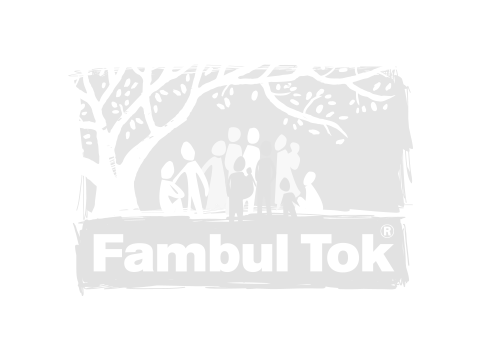On December 1st and 2nd I had the honor to attend and assist in facilitating the Fambul Tok Teachers’ Workshop held at the Pastoral Center in Kenema, in Sierra Leone. The workshop gathered together teachers from thirty schools that house Fambul Tok Peace Clubs from across Sierra Leone (in all 6 of Fambul Tok’s operating districts) to give updates on their clubs’ progress so far and plan how to develop the school clubs program further.
The workshop began by outlining the goals and values of the Fambul Tok Peace Clubs, or Wan Fambul Club program. The main goal identified was to actively involve students in Fambul Tok’s peacebuilding work in communities, introducing peacebuilding at the school level and helping students to learn and lead in their own communities. To teach peace in schools, through my western eyes, is quite a revolutionary idea. But why do not we teach our students peace? Listening to the teachers’ open discussion about the potential of their students, it was clear there was a shared understanding that young people had the ability to bring peace to their own homes and communities. The teachers present believed in the power, and the capability, of students. This establishment of ownership of the students for bettering their community is clearly an excellent place to start the development of a meaningful program and create sustainable community change.
After outlining the teachers’ expectations of the workshop, which included learning how to show children their power and how to bring back the Fambul Tok values to students and communities, we began updates about the peace clubs at each school. As schools shared about what their clubs had been doing since the program was established in February, it was clear that the amount of motivation and dedication demonstrated by student and teacher alike was monumental. The peace clubs benefited students, schools and communities. Teachers told stories of the clubs helping to decrease violence in schools and communities, and increasing the overall academic performance of the students involved.
Additionally, there were stories of students who used the lessons of Fambul Tok to moderate conflict in their lives, between their peers and at home. Students learned lessons of admitting mistakes, apology and forgiveness, and then integrated this knowledge into their daily lives. One student, Memunatu Conteh from Saint Stephen’s Technical Vocational Secondary School, wrote a letter to his peers in the US, about how after explaining the values of Fambul Tok to his family, he helped facilitate a better relationship between his brother and father.
Following the updates, we moved on to looking through the US Wan Fambul Starter Kit to see how it could be adapted for a Sierra Leonean audience. The Wan Fambul Club structure in the US is based on the following action categories: learn, engage, connect, share, and grow. After some discussion, it was established that the peace clubs in Sierra Leone also ran actions in each in these categories. The teachers held a brainstorm and came up with many great ideas for each action category. For example, a ‘learn’ action could be storytelling to teach about culture and tradition; an ‘engage’ action could be putting on a drama or play about Fambul Tok; a ‘connect’ action could be peace letters between schools in different chiefdoms; and a ‘share’ action could be discussing personal experience during the war on the radio. The ‘grow’ category was split between internal and external growth, focusing on large concepts like honesty, peace, empathy, and sharing of knowledge.
After reviewing the complete Starter Package, it was clear that there are many overlaps between the US and the Sierra Leonean clubs programs. While in very differing conflicts, and facing different challenges, both programs focus on the power that lies within students to make their community a better place.
I believe there is much that can be learned from the passion and dedication Sierra Leonean students and teachers have to community betterment, peacebuilding, and student advocacy. Therefore I hope the connection between the Wan Fambul program in the US and in Sierra Leone is fostered; connections between students of all backgrounds, who believe in peace, will result in a deeper understanding and richer learning of the Fambul Tok lessons.






